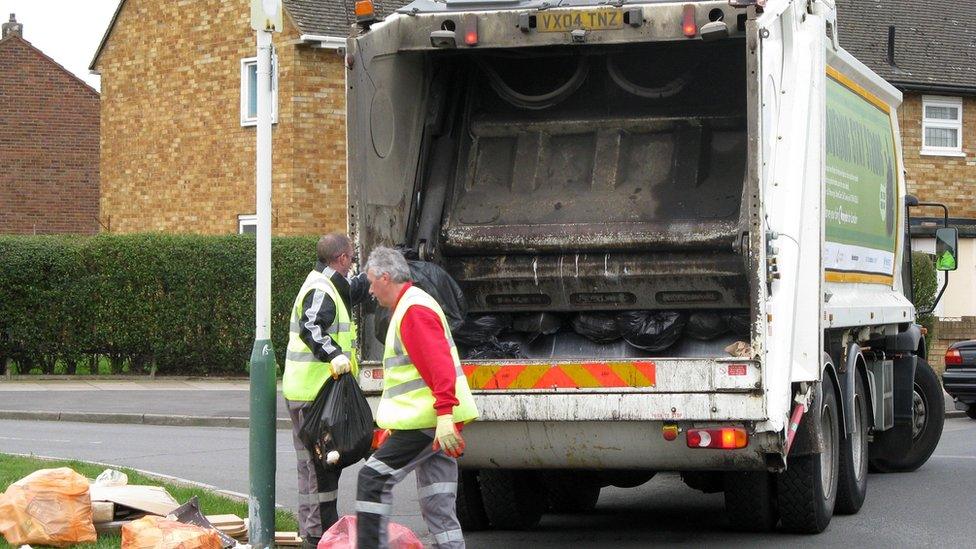South Cambridgeshire: Four-day week teams see agency spend rise
- Published

Almost 700 staff at South Cambridgeshire District Council have been trialling a four-day week
Two departments at a council running a four-day working week trial are spending thousands more on agency staff, new data has revealed.
Figures also show that almost 100 staff in South Cambridgeshire's waste department claimed overtime in November.
Nearly 700 staff at the authority are working 80% of their contracted hours with no drop in pay.
Performance levels show the council appears to have improved in some areas.
The council said there was evidence working a four-day week "means people [get] more done in less time", external.
But the authority's trial, which started in January 2023 - with bin crews joining in September - sparked a row with central government.
A minister demanded that it should stop, and in November the Department for Levelling Up served the authority with a "best value notice", external.
As part of the notice it has to share data with government every week in dozens of different areas, including how many staff are off sick and how quickly phone calls are answered.

Lee Rowley said councils should stop trials of four-day working when he was local government minister
The The data, external, made public for the first time on Monday, showed that in November the finance and waste departments spent more on agency staff than they did in an average month in 2022-23.
Last financial year, the finance department spent £590,345, an average of £49,195 a month.
In the four-day week data, shared with government, the finance team was said to have spent £108,089 between 30 October and 3 December 2023, more than double last year's average.
In the same period, the waste department spent £70,878, 53% higher than its 2022-23 monthly average of £46,272.
The council said agency staff in finance were brought in after a restructure in the department, to cover posts that were due to be closed. The waste service, it added, hired temporary workers to help launch new routes, which were needed because of new house building in its area.
More than 110 staff also claimed overtime in November, 99 of them in the waste services team. A survey, external of council staff has previously suggested that more than one in four staff said they "consistently" worked more than 80% of their contracted hours.
Responding to the overtime data, the authority said "we only pay overtime for specific, one-off, significant additional tasks" and that in the waste service "many overtime claims arise due to issues such as roadworks causing delays on the roads, vehicle breakdown or problems accessing properties to empty bins".

Some Cambridgeshire waste crews joined the four-day working trial in September 2023
Other departments reduced the amount they spent on agency staff, including the environment and executive office teams, which spent nothing on them in November.
Before the trial began, the council said it was spending £2m a year on 22 agency staff who were covering vacancies. That bill, the council claimed, could be halved if those vacancies were filled by permanent staff.
A committee heard in November that all but two of those posts had been filled or were no longer needed.
A council spokesperson added that its "agency spend still fluctuates due to the need to bring in agency staff to carry out short term programmes where permanent staff are not required", including for things like the Homes for Ukraine Scheme.
Performance levels
Data also showed how departments were performing.
In 2022-23, the council's contact centre answered 92.4% of calls in an average of 125 seconds.
Over the nine weeks for which data has been released, the contact centre was said to have answered a higher proportion of calls more quickly than the 2022-23 average.
The district's recycling rate was higher than the overall 2022-23 rate in eight of the nine weeks. The only week it fell below the previous year's rate was in the week including Christmas and New Year's Eve.
More than 99% of bins were said to have been consistently collected on time and 100% of emergency housing repairs were carried out within 24 hours.
'Incredibly brave'
Comments from the public have also been published alongside the data, 75% of which were rated "negative".
In one of the positive comments, the writer said they wanted to "commend" the council, while another said it was "incredibly brave to instigate such a forward thinking initiative".
But another said: "If you can perform five days work in four days then you either haven't got enough to do and/or there are too many staff.
"I'm sure we'd all like to be paid five days pay for four days work."
A business owner wrote that potential recruits to their firm were "pointing towards this 'four days work for five days pay' model" but that they "simply can't employ people on those terms" and "can't match the council generosity".
One resident said they were "very disappointed with the refuse collection", which "appears to start earlier so there is early noise disruption".
The council said it had always asked for bins to be ready for collection from 06:00, but a "re-routing exercise" may mean some bins are being emptied earlier than previously.

Follow East of England news on Facebook, external, Instagram, external and Twitter, external. Got a story? Email eastofenglandnews@bbc.co.uk, external or WhatsApp us on 0800 169 1830
- Published21 November 2023
- Published9 November 2023

- Published26 October 2023

- Published26 September 2023
